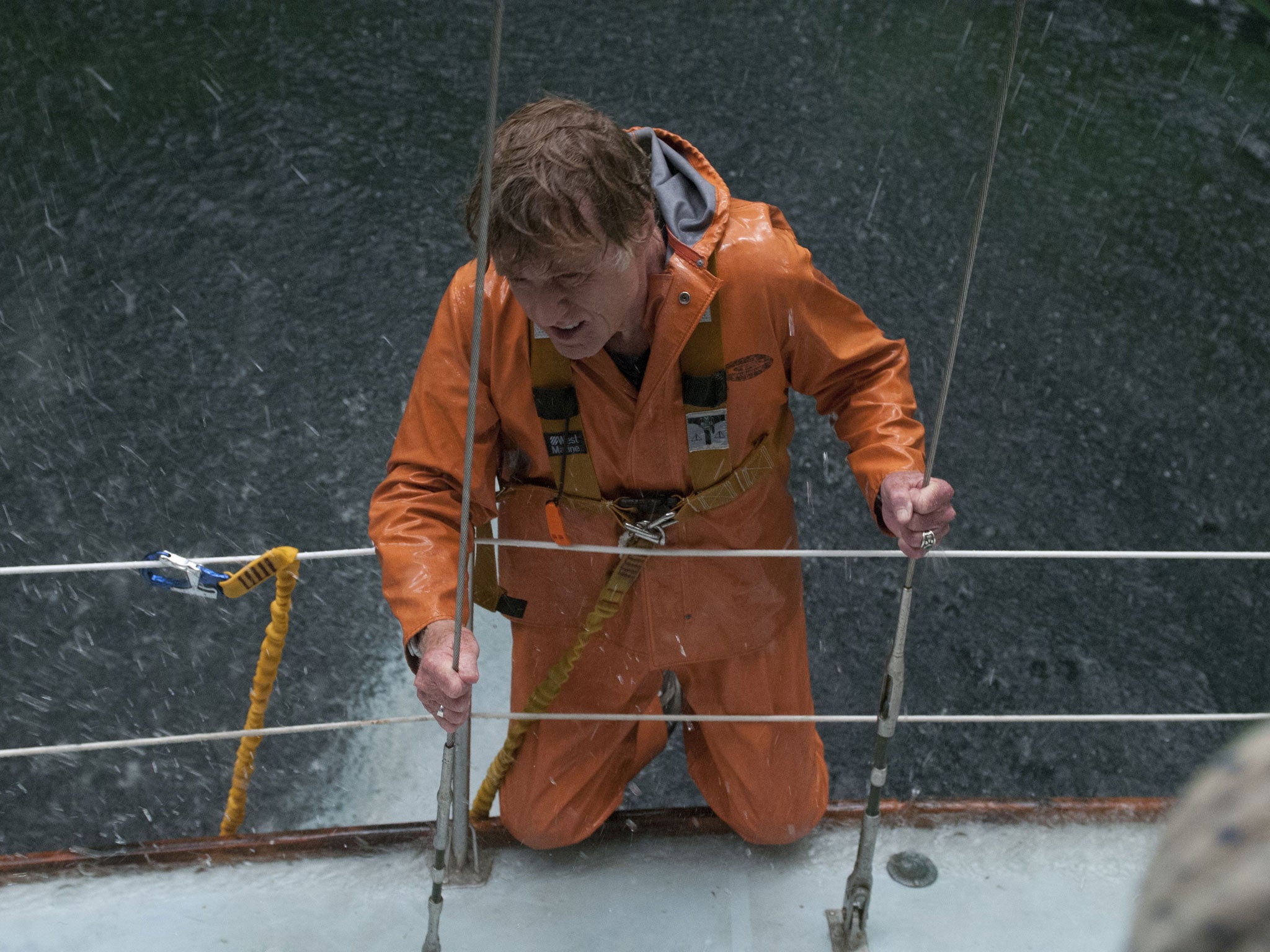All Is Lost, film review: Five stars for stunning new Robert Redford movie
J C Chandor’s brilliant film starring Robert Redford fulfills all the criteria of new mini-genre of survival stories

Existential survival stories are the new fad in cinema. Their appeal lies in their pared-down quality. After too many bloated comic-book franchises, it is refreshing to encounter lean, focused storytelling that pits individuals against the elements rather than against pantomime-style villains.
Another attraction is the “What would you do?” question that such films ask of their viewers. There is a macabre fascination in trying to work out whether we would take the same steps as the beleaguered protagonists to stave off disaster. Then, there is the metaphorical side. These films aren’t just about yachtsmen trying to work out which knots to tie to keep their vessels afloat, or climbers defying injury, or astronauts trying to get back to Earth. Their themes are far bigger than that.
J C Chandor’s brilliant All Is Lost fulfills all the criteria of this new mini-genre. The cast consists of Robert Redford... and nobody else at all. Redford says next to nothing beyond briefly yelling for help, swearing once and trying forlornly to issue an SOS message. We hear him in voiceover reading the words of the grim letter he is writing to his family about his plight, and then we flash back in time eight days to the freak accident with a metal container that so damaged his yacht. He is alone somewhere on the Indian Ocean, 1700 nautical miles from the Sumatra Straits.
What makes the film so utterly absorbing to watch is the common sense and pragmatism with which the sailor reacts to his situation. When the boat begins to leak, he plugs the leak. When his radio and navigation equipment are soaked, he tries to steer with a sextant. He conserves food and energy.
Chandor is fascinated by the minutiae of the yachtsman’s fight for survival: the amount he eats, his painstaking efforts to collect water, his forlorn attempts at fishing. The yachtsman is as precise as he can be in his actions, because he knows that the tiniest mistake will be fatal. We see him climbing up the mast. As the weather worsens, he even takes the time to shave. He drinks most of a bottle of rum. He stays busy both because he needs to and because it’s his only way of staving off despair.
All Is Lost has some aspects of an action movie or even a horror picture. There are juddering storm sequences in which the yacht is turned upside down. At one stage, he is even knocked out and gashes his head. The vessel, on which his survival depends, seems to be turning against him, Amityville-style.
Redford’s performance is credible, subtle and, ultimately, very moving. He clearly knows his way round a boat. Early on, he shows little emotion. He has too much to do to risk self-pity. Gradually, as his physical state worsens, his desperation becomes more obvious. Like a character in a Samuel Beckett absurdist play, he forces himself to go on, even as his hopes of survival diminish. The only information about his life beyond the boat comes in the letter he reads in which he expresses his feeling of failure and his determination to “fight to the end”. We don’t know why he embarked on his solo journey or anything about his family. This must have been a feat of endurance for an actor in his late 70s, but we never have the feeling that we are watching the travails of an old man. Redford’s character here is robust and stubborn.
For all its turbulence, All Is Lost is a very graceful film. There is a beguiling, dreamlike rhythm to the storytelling. Chandor throws in high angle shots which show Redford’s boat as a tiny little dot on a vast expanse of water. There are beautiful sunsets and cloudscapes as well as underwater sequences which show the marine life alongside Redford’s amoeba-shaped dinghy. The sound editing is remarkably detailed and does much of the work that dialogue would do in a more conventional film. Every creak of the boat or hiss of the wind is registered. Alex Ebert’s ambient, haunting music gives the film an elegiac feel.
The action of the film takes place over eight or nine days, but we have little sense of how much time is passing – only that the weather is constantly changing and that we are moving between night and day.
Just occasionally, we notice the artifice. Although the sailor is frequently soaked, he never seems to be feeling the cold. Certain scenes look as if they were filmed in a water tank rather than on the open sea. Even so, Chandor is remarkably successful in giving us a sense of the sailor’s complete isolation.
Alfonso Cuarón’s Gravity, in which Sandra Bullock’s astronaut is engaged in a similar fight for survival, has been a huge box-office hit. Audiences were so engrossed in her battle to stay alive that they didn’t worry about the lack of dialogue and the fact that the cast was so small. All Is Lost is even more pared down and experimental – and it doesn’t have the same eye-popping special effects. In its way, though, this is just as strong a piece of film-making. It is far more than simply a nautical yarn about human endurance in extreme circumstances. Chandor brings a mystery, transcendent quality and sense of absurdism to his storytelling that you simply won’t find in any conventional action movie.
Join our commenting forum
Join thought-provoking conversations, follow other Independent readers and see their replies
Comments
Bookmark popover
Removed from bookmarks